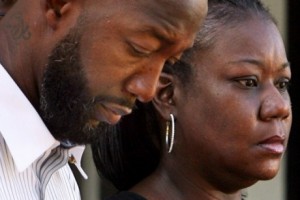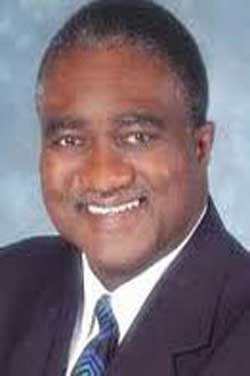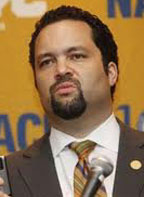
 By: George E. Curry
By: George E. Curry
NNPA Special Contributor
WASHINGTON (NNPA) – On the night of Feb. 26, Tracy Martin and his girlfriend had gone out to dinner in Sanford, Fla., leaving his 17-year-old son, Trayvon, behind at the townhouse with plans to watch the NBA All-Star game scheduled to be televised at 7 p.m. from Orlando’s Amway Center.
Trayvon decided to walk to a nearby 7-Eleven convenience store to pick up a bag of Skittles candy and a can of Arizona iced tea before settling in to watch East v. West all-stars. On his way back to the gated community, however, Trayvon was stalked by George Zimmerman, a non-Black neighborhood watch captain armed with a 9 millimeter handgun and a head full of stereotypes about African-American males.
According to 911 tapes, Zimmerman, 28, told the emergency police dispatcher that he had spotted a suspicious young male walking in the neighborhood. “This guy looks like he’s up to no good. He is on drugs or something.” Zimmerman said, “These _ _ _holes. They are always getting away.”
When the dispatcher asked Zimmerman if he was following the young man in his vehicle, Zimmerman confirmed that he was. The 911 operator said, “OK, we don’t need you to do that.” Still, Zimmerman continued to trail Trayvon, who was unarmed. At one point, Zimmerman got out of his SUV, confronted Trayvon and fatally shot him in the chest.
Tracy Martin was unaware that his son, who was visiting from Miami, had been killed around 7 p.m. that Sunday.
Martin, Trayvon’s mother, Sybrina Fulton; Benjamin Crump, the family lawyer; Al Sharpton and former New York Gov. David Patterson participated in an exclusive 1-hour telephone conference call last Thursday with more than three dozen publishers from the National Newspaper Publishers Association (NNPA).
Martin told publishers how he learned that his son had been killed.
“I had been out to dinner. When we got back between 10:15 and 10:45, he wasn’t at home. The night before, he had been to the movies with my nephew, who had recently moved up to the Orlando area from Miami. Every time Trayvon would come up here, they would find something to do, usually they would go to dinner. My nephew is 20 years old, a very responsible young man. So there was not panic at that moment that he was not home. I made several attempts to call his cell phone and it was going straight to voicemail. I called my nephew’s cell phone and it was going straight to voicemail. So at that point, I figured they had been in the movies because they would always go to the movies.”
Tracy Martin and his girlfriend went to bed. But the next morning, the day Martin and his son had planned to return to Miami, he learned that Trayvon still wasn’t back in the house. Tracy called his nephew again, this time reaching him and learning that Trayvon wasn’t with him.
“I had [his girlfriend] call juvenile justice, just to check and see if anyone by the name of Trayvon Martin had been picked up. No Trayvon Martin,” the father told NNPA publishers. “My next call was to the Seminole County Sheriff’s Department to see if any kid had been picked up.
“My third call was to a non-emergency number at the Seminole County Sheriff’s Department and I informed them that I was filing a missing person’s report. I let them know it hadn’t been 24 hours, but it was unusual for Trayvon not to return home. I told them we were supposed to be leaving that morning when we woke up. They asked me a few questions about him: date of birth, height, complexion, weight and they told me they would dispatch a unit. Five minutes later, she called me back and asked what was he last wearing. I gave them a description of the clothes that he had on last. She said a unit would be out.”
At that point, Tracy Martin still had no clue that his son was dead.
He said, “I got up, got on clothes, went outside because I knew my kid was going to walk back up to the door.” Instead, three cars pulled up to the door, one of them an unmarked police vehicle.
“The first officer approached. I introduced myself and told him I was filing a missing person’s report. The second person to approach was a plainclothes detective. He asked me if I had a recent picture of Trayvon and it just so happened that I had taken a picture in my camera, maybe a week or two prior to the incident. I showed them the picture. He told me to give him a second. He walked to his vehicle, retrieved a folder and asked could we go into the house. We walked into the house. He told me he was going to show me a photo and that he was going to ask me if this was my kid. And he pulled out the photo. From that point, it’s been like a nightmare.”
That nightmare was compounded by the decision not to arrest or prosecute Zimmerman, who admitted killing Trayvon. Led by Attorney Benjamin Crump, the family has been making the rounds of national television programs to share their story – and to express their outrage that Zimmerman hasn’t been brought to justice. Protests, many of them led by college students, have taken place across the country. On Monday, hundreds of students at Dr. Michael M. Krop Senior High School in Miami were dressed in black and wore hoodies to mourn their slain schoolmate.
“In the Black community, we all see Trayvon in ourselves,” Sharpton said. “We all subconsciously know that we’re born as suspects rather than citizens and that’s what Trayvon was – he was a suspect.”
Sharpton explained, “What happened to Trayvon is that it brought to the surface the fear that all of us have for our children and ourselves. I think White America was stunned. Black America became ignited when we finally got it out there. They [Whites] thought having a Black president had solved it. And now, people working in their offices, in the next cubicle, were saying, ‘No, this is me.’ They relate to Trayvon – it was me.”
After three weeks of mobilizing on social media, keeping the story alive in Black newspapers and African-American radio, the mounting pressure forced Sanford, Fla. officials to release the 911 tapes. Those tapes – which show that Zimmerman disobeyed the 911 dispatcher’s directive that he not follow Trayvon – along with the decision not to arrest Zimmerman, forced Police Chief Bill Lee to temporarily step down as police chief on Thursday.
On April 10, a grand jury will be convened to determine whether Zimmerman should be indicted. Both the U.S. Justice Department’s civil rights division and the FBI are looking into the case to determine if any federal statues were violated.
Florida Gov. Rick Scott has appointed a Task Force on Citizen Safety and Protection to investigate how such tragedies can be avoided in the future. Lt. Gov. Jennifer Carroll will chair the special panel. Rev. R.B. Holmes, Jr, publisher of the Capital Outlook in Tallahassee, will serve as vice chair.
Sharpton led a rally Thursday night of more than 30,000 people in Sanford, many of them from around the nation.
Referring to the police chief, Sharpton said, “We did not come here for a temporary leave of absence. We came for permanent justice – arrest Zimmerman now.”
On Friday, President Obama expressed concern about the case.
“I think every parent in America should be able to understand why it is absolutely imperative that we investigate every aspect of this and that everybody pulls together, federal, state, and local, to figure out exactly how this tragedy happened,” Obama said. He added, “If I had a son, he’d look like Trayvon.”
If the son had dressed like Trayvon, he would have come under criticism.
On the March 23 edition of Fox News’ Fox & Friends, Fox News contributor Geraldo Rivera said, “I am urging the parents of Black and Latino youngsters particularly to not let their children go out wearing hoodies. I think the hoodie is as much responsible for Trayvon Martin’s death as George Zimmerman was.”
For some reason, Blacks are stigmatized for wearing a hoodie – a sweatshirt with a hood attached to it – but Whites, such as New England Patriots football coach Bill Belichick and Facebook co-founder Mark Zuckerberg, are not.
NBA star Dwayne Wade posted a photo of himself Friday in a hooded top to his social media pages, while LeBron James tweeted a photo of 13 Miami Heat players wearing black hoodies with their heads bowed in a tribute to Trayvon.
”I saw a post that D-Wade had saying, ‘I am Trayvon Martin,”’ Tracy Martin said. ”To see all these athletes put Trayvon in the same sentence with them, it feels real good. Trayvon was an excellent athlete and if he could hear them saying his name, he would be so moved by it.”
On Sunday, many churches honored Trayvon, who was wearing a hoodie when he was killed.
Rev. Raphael G. Warnock, senior pastor of Ebenezer Baptist Church in Atlanta, preached the 11 a.m. service in a Morehouse College hoodie.
In his sermon, Warnock compared Trayvon Martin to Emmett Till, the 14-year-old Chicago youth who was murdered near Money, Miss. in 1955 for allegedly whistling at a White woman. ”Both young boys were killed for crossing some imaginary social line,” Warnock said. ”Mr. Zimmerman took a gun to a Skittles fight. Apparently Zimmerman is innocent until proven guilty and Trayvon is guilty until proven innocent.”
Sybrina Fulton is still living with the pain of her son’s death.
“It just reminds me of an awful dream,” she said in the conference call with NNPA publishers. “It just seems like the pain goes away temporarily and then it comes back. It just feels like my heart is just heavy. I still have tears, I still cry. It’s just difficult. Each day is just difficult to get by.”
That pain was exacerbated Monday with the disclosure Monday that Trayvon was given a 10-day school suspension after traces of marijuana were found in his book bag. At a hastily called news conference, the family lawyer said the disclosure is irrelevant to the tragic events of Feb. 26.
With her voice breaking, Sybrina Fulton, Trayvon’s mother, said: “They’ve killed my son and now they’re trying to kill his reputation.”
Sanford police claim they couldn’t arrest Zimmerman because he was protected under Florida Statute 776.013 (3), the state’s stand your ground law that gives citizens broad protection if they are acting in self-defense.
Jeb Bush, who as governor of Florida signed the stand your ground bill into law, said the legislation does not cover the neighborhood watch captain who shot Trayvon Martin to death.
“This law does not apply to this particular circumstance,” Bush said after an education panel discussion at the University of Texas at Arlington. “Stand your ground means stand your ground. It doesn’t mean chase after somebody who’s turned their back.”
Former New York Gov. David Patterson said, “The only reason that the self-defense law has come up is that it was raised by the shooter as a pretext for why he shot a 17-year-old kid who had Skittles and an iced tea when he had a car and a 9 millimeter gun. Zimmerman is the pursuer at all points in this situation. He is always the aggressor. He is always moving forward and the victim is moving backward. Somehow, when the police write the story, those two elements got turned around.”
Crump, the family attorney, called it a case of racial profiling.
“He used every stereotype for a Black man you can use,” the lawyer said. “He said, No.1, he looked suspicious. No.2, he must be high. No. 3, he’s looking to break in some place. And the police took that as gospel.”
Reflecting on the moment he was asked by police to identify his son, Tracy Martin said, “I can’t describe the feeling, I can’t describe what was going through my mind because I was actually staring at a photo of my pride and joy on the ground dead. I still see the photo now – his eyes weren’t closed all the way, his mouth wasn’t closed, it was the worst feeling of my life.”




Be the first to comment